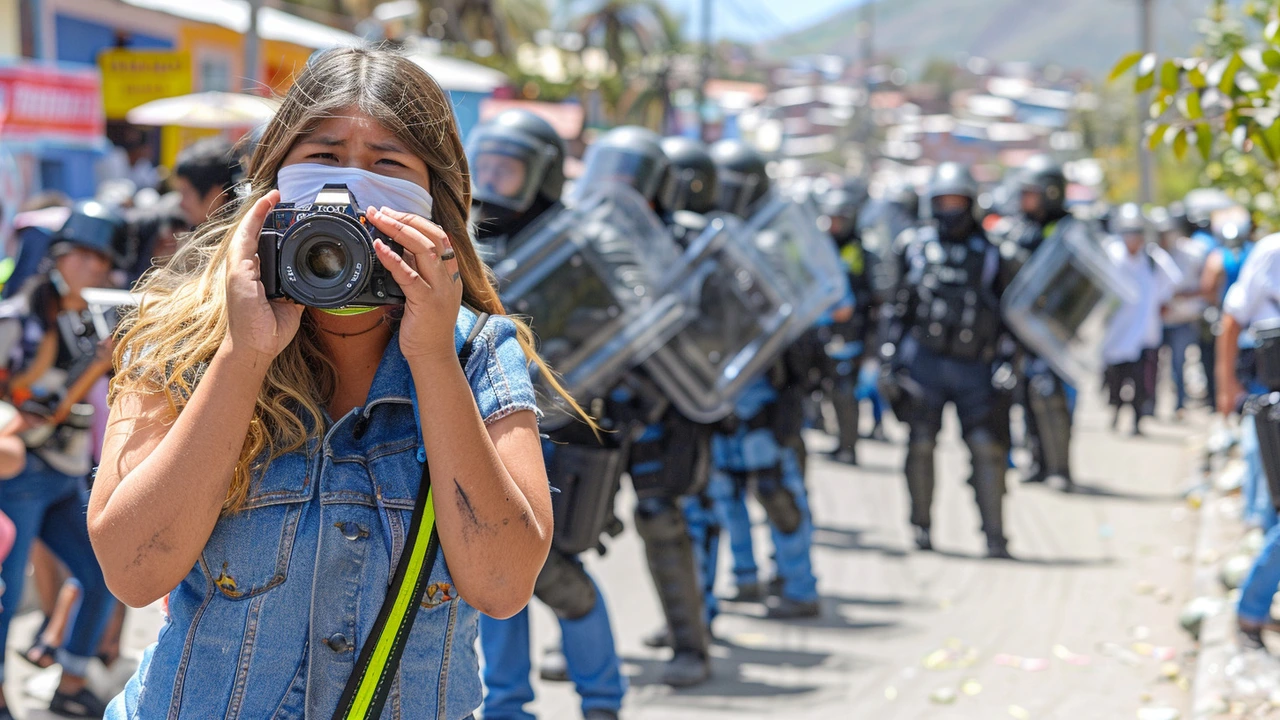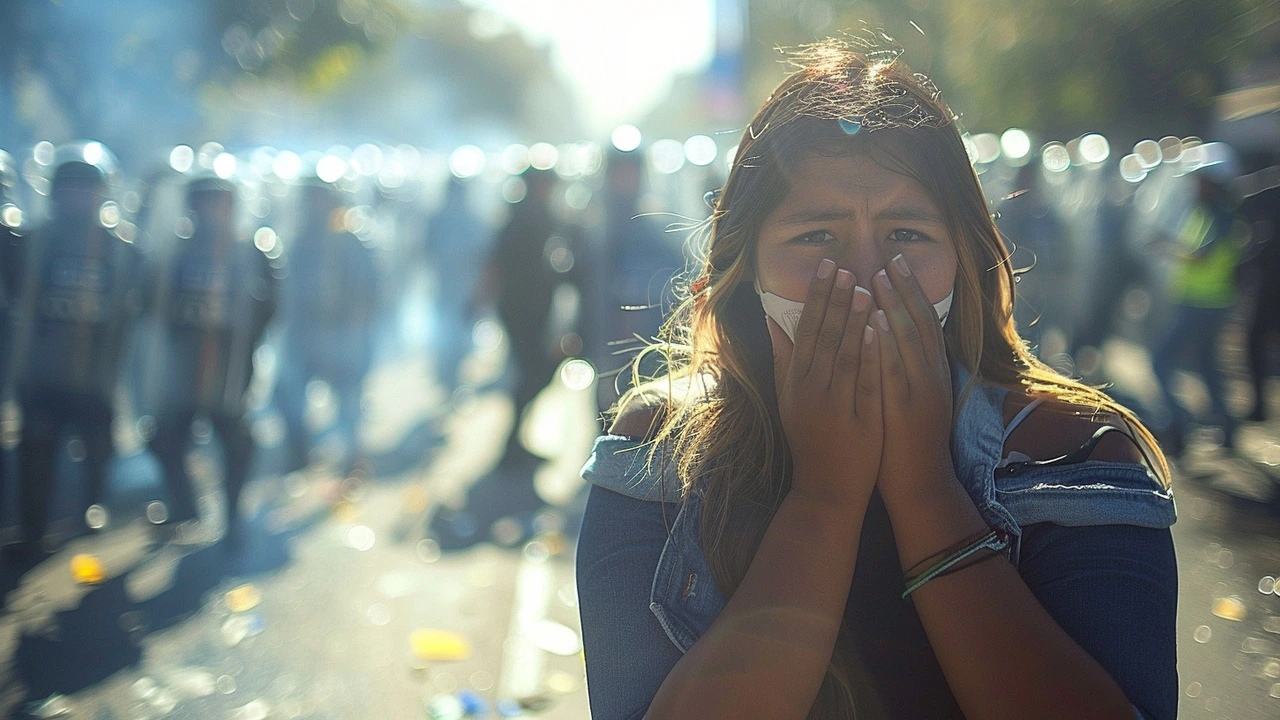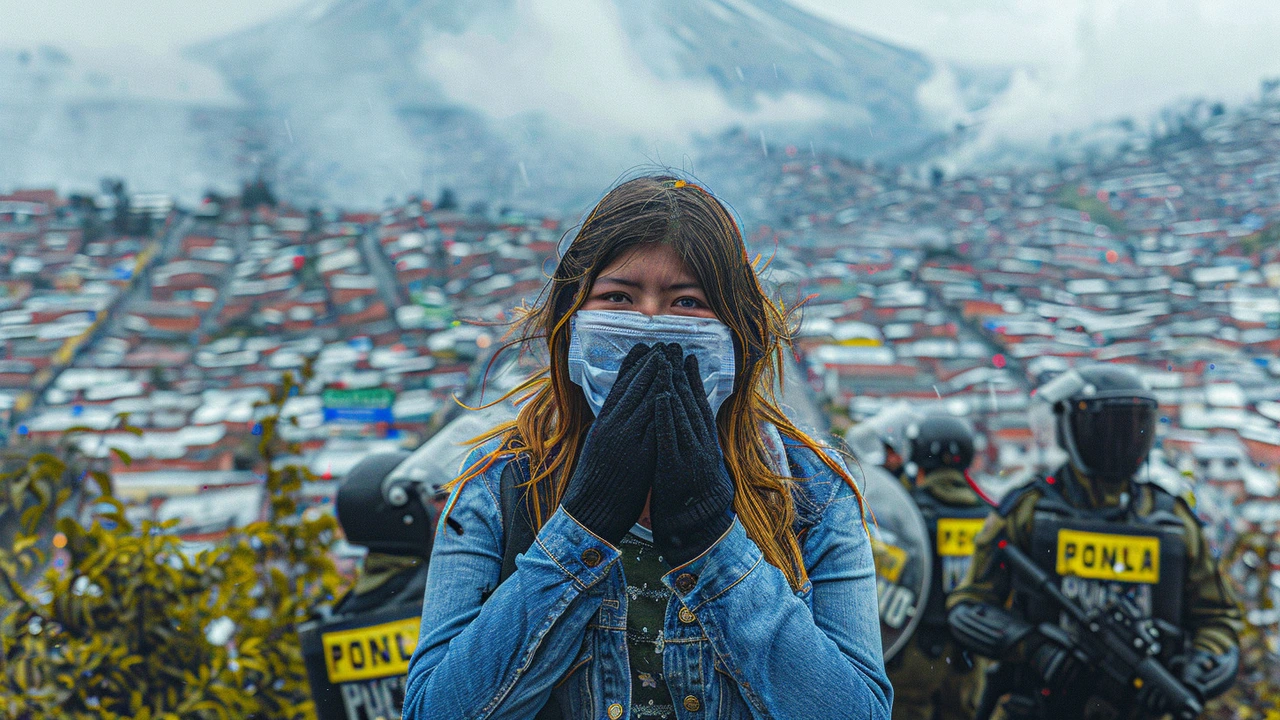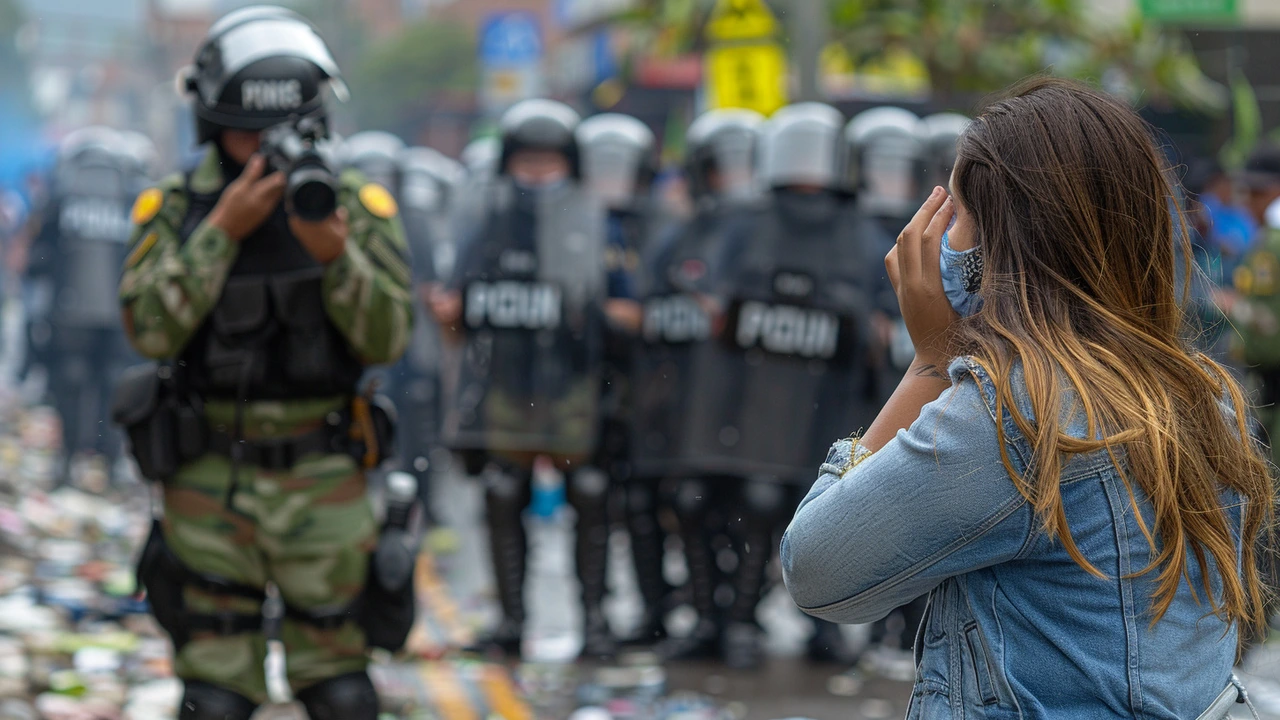Bolivia's Democratic Victory
In a region marked by political instability and military interventions, Bolivia is emerging as a beacon of democratic resilience. The country's recent presidential election saw Luis Arce securing a landslide victory, an event that stands as a testament to Bolivia's commitment to democratic processes despite a tumultuous past. Arce, a close ally of former President Evo Morales, has ushered in a new era, underscoring the strength and endurance of Bolivia's democratic institutions.
The significance of this election extends beyond Bolivia's borders, reflecting a broader trend away from military coups that have historically disrupted Latin American nations. Bolivia's unwavering stance towards maintaining democracy after a military coup in 2019 that ousted Morales is particularly noteworthy. With such a legacy of political upheaval, the successful and peaceful transition of power in the recent election is both remarkable and inspiring.
A Tumultuous Past: The 2019 Coup
The military coup in 2019 was a pivotal moment in Bolivia's recent history. It led to the resignation of Evo Morales, the country's first indigenous president, who had served since 2006. The coup followed allegations of electoral fraud during the 2019 elections, causing significant civil unrest and political turmoil. Morales' departure left a vacuum that threatened the stability of Bolivia’s democracy.
This period of uncertainty posed a severe test for Bolivia’s political framework. Protests erupted, and the interim government faced immense challenges in maintaining order while preparing for new elections. The 2019 coup thus serves as a backdrop against which the recent election's success can be fully appreciated. It highlights the resilience of Bolivia’s democratic institutions and the electorate's commitment to peaceful, democratic processes.

International Observers Endorse Free and Fair Elections
One of the critical factors contributing to the credibility and recognition of Bolivia's recent election was the endorsement from international observers. Various independent bodies monitored the electoral process, affirming its fairness and transparency. Their approval serves to bolster confidence both domestically and internationally in Bolivia's commitment to democracy.
International organizations such as the Organization of American States (OAS) and the European Union (EU) were actively involved in monitoring the elections. Their reports lauded the conduct of the elections, noting the absence of fraud and manipulation that characterized the allegations in 2019. This international seal of approval not only validates the election outcome but also strengthens Bolivia's democratic image on the global stage.
Political Stability Amid Regional Turmoil
Bolivia's achievement is significant within the broader context of Latin America, a region known for its history of military coups and political instability. The successful election and peaceful transition of power symbolize a departure from this troubled past. It sends a message of hope and possibility, suggesting that sustained democratic governance is achievable despite historical and regional challenges.
According to Michael Shifter, president of the Inter-American Dialogue, Bolivia's election represents a 'remarkable achievement' and a 'testament to the country's democratic resilience.' His remarks emphasize that what Bolivia has accomplished is not merely a routine democratic exercise but a profound step towards political stability and maturity in Latin America.

Global Recognition and Support
Following Luis Arce's victory, there was an outpouring of congratulations from the international community. The United States and European Union, among others, welcomed the election results and expressed support for Bolivia's democratic journey. Such endorsements are crucial as they provide Bolivia with diplomatic legitimacy and pave the way for constructive international relations.
This global support further delineates the significance of Bolivia's democratic success. At a time when democratic norms are being tested around the world, Bolivia stands out as a positive example. The international recognition also brings with it the potential for increased foreign investment and collaboration, which can aid Bolivia's economic and social development.
The Future of Democracy in Bolivia
As Bolivia moves forward under the leadership of Luis Arce, the challenges of governing a nation with a complex political history remain. Arce’s administration will need to address the divisions that emerged from the coup and subsequent elections. Moreover, economic challenges exacerbated by the COVID-19 pandemic will require astute management and policy-making to ensure stability and growth.
However, the optimism surrounding Bolivia's recent electoral process provides a solid foundation. The inclusive and transparent nature of the elections has set a precedent that the government should strive to uphold. By maintaining this commitment to democracy, Bolivia can continue to serve as a model for other nations in the region grappling with similar issues.

Conclusion
In conclusion, Bolivia's recent presidential election is more than just a political event; it is a landmark achievement that underscores the country's democratic resilience. The peaceful and fair election, monitored by international observers and praised globally, marks a significant step away from the turbulent history of military coups that have plagued Latin America. Bolivia's journey serves as a testament to the enduring strength of democratic institutions and offers hope for continued democratic governance in the region.
As Bolivia navigates its future under new leadership, the lessons learned and the precedents set during this election will be invaluable. With sustained commitment and global support, Bolivia's democratic resilience has the potential to catalyze further positive political developments, both within its borders and across Latin America.






11 Comments
Elizabeth Alfonso Prieto
June 29, 2024 AT 15:40 PMI just can't believe how people are acting like this is some kind of miracle. Bolivia's been a mess since Morales got kicked out, and now they're giving him buddy Arce a standing ovation? Please. This isn't democracy-it's just the same old corrupt machine with a new coat of paint.
And don't even get me started on the OAS. They were the ones who called the 2019 election fraudulent in the first place-now they're suddenly experts on fairness? That's not oversight, that's theater.
They didn't fix anything. They just re-ran the same election with more cameras and less chaos. Big whoop.
Harry Adams
June 30, 2024 AT 22:23 PMOne must interrogate the epistemological foundations of this so-called 'democratic resilience.' The narrative presented here is a textbook case of liberal triumphalism-reifying institutional continuity while eliding the structural violence underpinning Morales' tenure.
Arce's victory, while technically procedural, merely reinstates a clientelist network predicated on rent-seeking and populist patronage. The OAS endorsement? A performative legitimizing ritual, bereft of substantive accountability mechanisms.
One wonders whether the 'peaceful transition' is merely the absence of bullets, not the presence of justice. The electorate, in this view, is not sovereign-it is manipulated by a well-oiled machine of symbolic capital.
Kieran Scott
July 1, 2024 AT 05:42 AMLet’s be real: Bolivia didn’t have a democratic election. They had a rehearsed reenactment. The 2019 coup wasn’t a coup-it was a constitutional correction. Morales was running for a fourth term after the supreme court illegally overruled term limits. The whole thing was rigged from the start.
Now Arce is back with the same crew, same cronies, same state-controlled media, same suppression of dissent under the guise of 'protecting indigenous rights.' The international community is gullible. The OAS? A political tool. The EU? Too busy lecturing Ukraine to notice this is just a regime reboot.
And don’t pretend this is about 'resilience.' It’s about inertia. The people didn’t choose democracy-they chose the lesser of two corrupt options. And now we’re supposed to applaud? That’s not hope. That’s resignation.
Joshua Gucilatar
July 2, 2024 AT 00:21 AMYou folks are missing the forest for the trees. The real story here isn’t Arce-it’s the Bolivian people. They’ve been through hell: a coup, a pandemic, economic collapse, and a decade of ideological warfare. And yet, they showed up. In droves. With ID cards, with patience, with quiet fury at being lied to again.
This wasn’t a victory for MAS-it was a victory for civic muscle. The ballot boxes didn’t lie. The observers didn’t lie. The streets didn’t riot. That’s not luck. That’s discipline. That’s maturity.
And yeah, the system’s flawed. But flawed systems can still be redeemed by people who refuse to let chaos win. That’s the quiet revolution here-not in the halls of power, but in the line at the polling station.
jesse pinlac
July 2, 2024 AT 09:34 AMThe notion that this is a 'landmark achievement' is laughable. Bolivia has been a banana republic since the 1950s. This election was orchestrated by a party that has systematically dismantled checks and balances, weaponized the judiciary, and silenced independent media under the banner of 'decolonization.'
International observers? They’re paid consultants with agendas. The OAS has endorsed more sham elections than a carnival sideshow. And calling this 'democratic resilience'? That’s Orwellian. Resilience implies endurance of principle. This is endurance of power.
Arce didn’t restore democracy-he restored a dictatorship with better PR.
Jess Bryan
July 2, 2024 AT 18:42 PMThey say the election was fair. But who counted the votes? Who controlled the servers? Who decided which ballots got 'lost'? The same people who 'found' Morales' fraud in 2019?
Remember how the US and EU suddenly cared about democracy the moment Morales was gone? Now they're all 'congratulations!'-but they didn’t say a word when the interim government jailed activists and burned indigenous flags.
This isn't democracy. It’s a script. Written by the same hands. Just with different actors. And the world is too lazy to look behind the curtain.
Ronda Onstad
July 4, 2024 AT 18:17 PMI think what’s beautiful here isn’t the politics-it’s the people. I’ve read interviews with Bolivian voters-indigenous women in La Paz, miners from Oruro, students in Cochabamba-and they’re not talking about ideology. They’re talking about safety. About not having to flee their homes. About their kids not growing up in fear.
That’s what this election gave them: a chance to breathe.
Yes, the system’s imperfect. Yes, corruption’s still there. But for once, they got to choose without guns pointing at them. And that’s worth celebrating, even if it’s messy.
Democracy isn’t about perfection. It’s about showing up, again and again, even when you’re tired. And Bolivians showed up.
Steven Rodriguez
July 5, 2024 AT 21:57 PMLet’s cut the nonsense. This isn’t democracy-it’s a socialist takeover disguised as a vote. The US and EU are applauding because they want Bolivia’s lithium. They want the mines. They want the supply chain.
Arce is just the face they’ve chosen to make it look legitimate. The same people who cried 'dictator!' when Morales was in power are now singing his ally’s praises. Hypocrisy? No. Strategy.
This isn’t about rights. It’s about resources. And the world is complicit. Don’t pretend this is moral. It’s transactional. And we all know it.
Zara Lawrence
July 7, 2024 AT 00:09 AMI find it deeply concerning that the international community has so readily accepted this outcome without demanding accountability for the human rights violations committed during the 2019–2020 interim period. The systematic targeting of opposition figures, the destruction of evidence, the silencing of journalists-none of this has been addressed.
And yet, we are told to celebrate? This is not resilience. It is amnesia.
One cannot build democracy on the foundation of unacknowledged trauma. One must reckon. One must prosecute. One must reconcile.
Instead, we have optics. And optics are not justice.
Ashley Hasselman
July 8, 2024 AT 10:28 AMWow. A whole article about how Bolivia 'defeated' democracy by voting for the same guy who got kicked out for cheating. Groundbreaking.
Next up: 'Japan Shows Democratic Resilience by Reelecting Prime Minister Who Stole the Election.'
Kelly Ellzey
July 8, 2024 AT 12:09 PMI just want to say-this is the kind of moment that reminds me why I believe in people, even when the headlines make me want to crawl under a rock.
Bolivia’s story isn’t about one man, or one party, or even one election-it’s about a nation that kept showing up, even when they were broken, even when they were scared, even when the world was watching with skepticism.
They didn’t wait for permission. They didn’t wait for saviors. They just… voted. Quietly. Proudly. Together.
And maybe that’s the real miracle-not the result, but the courage it took to get there.
So thank you, Bolivia. For reminding us that hope isn’t loud. It’s patient. It’s ordinary. And it’s powerful.